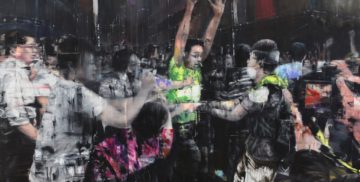Emma Howell is a Cotswolds based artist, whose work, which combines an array of vivid, washy mark-making techniques, has been making quite the splash. After losing her father in 2016, Howell began rebuilding her relationship with a world that she had deemed spiritless, dark and melancholic, through art. Her abrupt confrontation with grief urged her to grow a deeper respect for the everyday and to physically and mentally engage with nature, society and culture. Her paintings, that she says, are a translation of life and all it has to offer.
Emma Howell with a work from The How Series
One of Howell’s latest bodies of work is The How Series, which she says are deconstructed and composite representations of how she sees the world around her; ‘A fast, corkscrewed mark could be a moment of frustration, the rhythm of the wind or a roughly textured surface; a bold puddle of blue could represent deep feelings of melancholia, a mass of rain or simply, the hue of the sky; repetitive lines could be a meditative exercise, contours of cliffs or a boring conversation…' On the opening night of Howell's The How Series exhibition, she sold all but two of the works, and images from The How Series have already made it to several private collections in Europe and North America.
Here, as part of our series on emerging talent, Candid Magazine speaks to the artist about her life, work, and times.
Candid Magazine: When did you realise you wanted to be an artist?
Emma Howell: Drawing and painting seems to be an innate method of self-expression for me. I don’t actually remember notfeeling like an artist. However, it’s taken a few years of trying out various other careers before realising that making art was actually what I wanted to dofor a job.I admit – it was at the back of my mind, but I’ve always considered it to be too risky. It wasn’t until my father passed away that I became brave enough to dive into this uncertain pool and start marketing my work on Instagram.
Emma Howell in her studio
CM: Do you have formal arts training?
EH: Yes, I studied a 3 year bachelor's degree in Fine Art at the University of Gloucestershire, and graduated in 2015 with first class honours.
CM: Where does your inspiration come from?
EH: Shapes and colours from the overlooked everyday consistently emerge within my work. Inspiration can come from anywhere: the texture of a rock, an overheard conversation, the colour of a swimsuit, the sound of footsteps, a sudden feeling of enthusiasm, anything. It’s hard to pinpoint one particular subject matter – and this is exactly why my work will be ever-evolving.
It will always relate to where I’ve been, who I’ve met, how I feel.
Emma Howell's work hanging in her studio
CM: How would you describe your work?
EH: I’d describe my work as painted experiences or translations of life onto surface. For me, a blank surface (journal, paper or canvas) is an enriching opportunity to expose new perceptions, and to demonstrate that there is more than one way to view the world.
CM: What does a typical working day for you look like?
EH: To be honest, there isn’t a “typical” working day – each day generally differs in my practice. I’d usually head to my studio in the early morning after a workout, to continue whichever project I’m currently working on, be it a commission, collaborative work, my own paintings, writing, until about 4pm. Social media updates, admin and website work usually happens in the evening back at home. On more flexible days, I make every effort to get out into the landscape to connect with the world and document new experiences in my journals.
Emma Howell's studio
CM: What has been your proudest achievement to date?
EH: In terms of work, I’d say my most proud achievement to date was planning, building and curating my first solo exhibition, which was sponsored by Hobbycraft and almosta sell-out. In the months leading up to it, I doubted my ability a lot and felt like throwing in the towel several times. However, I learnt from the whole experience that I work quite well being scared at the deep end.
CM: Where would you like to be in 10 years?
I’d like to see myself not only continuing my practice as an artist – so making, selling and exhibiting work worldwide, but also lecturing in Fine Art and hosting workshops at schools and universities.
I find it important that the world continues to grow new opportunities for artists, so collaborating with brands and businesses for innovative projects would be a great goal to have.
I’d love to take a road trip across the country to soak up new surroundings, explore new landscapes and make/sell art on the road… But I’d need a larger vehicle for that!
Works from Emma Howell's The How Series
CM: Do you think it’s hard to be an artist living outside London?
EH: An instant answer would be yes. In London, you’re immersed in an exciting and fast paced culture of creatives, with galleries on your doorstep and meet-ups every week. So, you could say that there are more opportunities to get your work out in front of the right people at the right time. However, look at the expense of living and the competition you have there. On a bad day, many emerging artists must feel like they’re lost in a sea of phenomenal talent, making every effort to stay on the surface.
Cheltenham is much smaller, and (I assume) a lot easier to be remembered, seeing as there are far fewer artists residing here. I do always wonder what it must be like to be an artist in London. But I feel my mind and body are far more capable dealing with the challenges over here than over there, at this time in my life.








